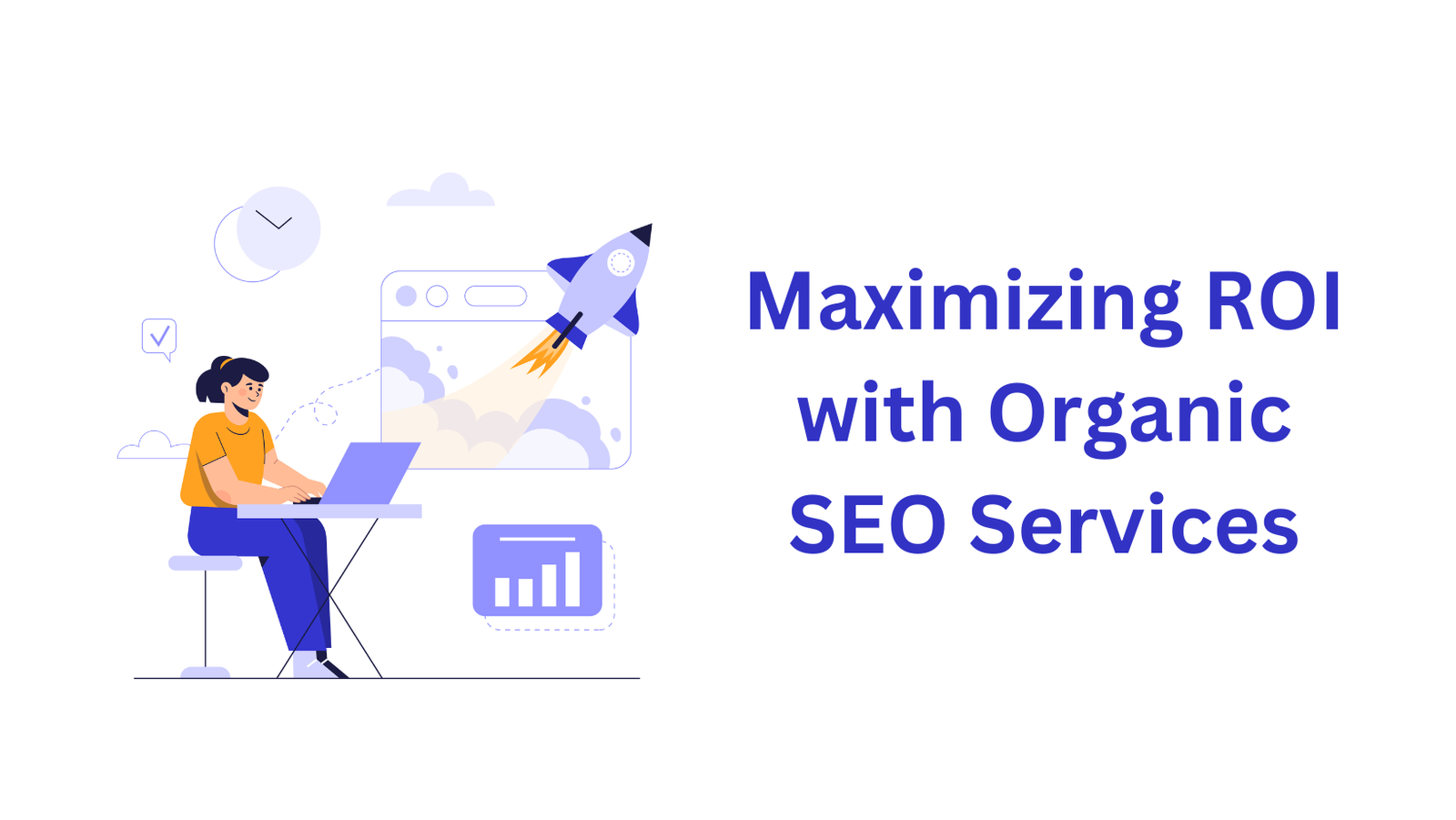Achieving a high return on investment (ROI) with organic SEO services requires a strategic approach and an understanding of how SEO can contribute to your business goals. Organic SEO is about improving your website’s visibility in search engines without paying for ads. When done correctly, it can lead to substantial gains in traffic, engagement, and conversions, all while being cost-effective compared to paid advertising. This guide will delve into how you can maximize ROI with organic SEO services, focusing on strategies, best practices, and key considerations.
Understanding ROI in SEO
What is ROI?
Return on Investment (ROI) is a metric used to evaluate the profitability of an investment. In the context of SEO, ROI measures the benefits gained from SEO efforts relative to the costs involved. A positive ROI means that the gains from SEO activities surpass the investment made.
Why is ROI Important in SEO?
SEO is a long-term strategy, and its benefits may not be immediately evident. Understanding ROI helps you assess the effectiveness of your SEO initiatives, allocate resources wisely, and make informed decisions about continuing or adjusting your SEO strategy. Maximizing ROI ensures that your SEO investments contribute to your overall business objectives and provide substantial value.
Setting Clear SEO Goals
Importance of Setting Goals
Setting clear and measurable SEO goals is crucial for maximizing ROI. Goals provide direction and help focus your efforts on specific outcomes. Without clear goals, it’s challenging to evaluate the success of your SEO activities and identify areas for improvement.
Types of SEO Goals
Traffic Goals
Traffic goals involve increasing the number of visitors to your website. Metrics such as organic search traffic, overall website visits, and unique visitors are key indicators. By aiming to drive more traffic, you enhance your site’s visibility and reach a broader audience.
Conversion Goals
Conversion goals focus on turning visitors into customers or leads. This could involve increasing sales, generating leads, or encouraging other valuable actions on your site. Optimizing for conversions ensures that your SEO efforts contribute to achieving meaningful business objectives beyond just attracting visitors.
Engagement Goals
Engagement goals aim to improve how users interact with your website. Metrics like average session duration, pages per session, and bounce rate are important for understanding user engagement. Higher engagement often leads to better user satisfaction and increased chances of conversion.
Conducting Effective Keyword Research
The Role of Keyword Research
Keyword research is the process of identifying the terms and phrases that potential customers use when searching for products or services like yours. Effective keyword research helps you target the right audience and improves your chances of ranking well in search engine results.
Best Practices for Keyword Research
Identifying Relevant Keywords
Start by identifying keywords that are relevant to your business and audience. Consider the products or services you offer and the specific terms users might use to find them. Use keyword research tools such as Google Keyword Planner, SEMrush, or Ahrefs to discover keywords with good search volume and relevance.
Analyzing Keyword Competition
Understanding the competition level for your chosen keywords is essential. Highly competitive keywords might be challenging to rank for, especially for smaller or newer businesses. Use a mix of high-competition and long-tail keywords to balance your strategy and improve your chances of ranking.
Focusing on User Intent
User intent refers to the purpose behind a search query. It’s crucial to target keywords that align with what your potential customers are looking for. For example, a search for “best running shoes for marathon” indicates research intent, while “buy running shoes” suggests a buying intent. Aligning your content with user intent helps attract more qualified traffic and improve conversions.
Optimizing On-Page SEO
Key Elements of On-Page SEO
On-page SEO involves optimizing individual web pages to rank higher in search results and attract relevant traffic. Key elements include title tags, meta descriptions, headings, and content.
Best Practices for On-Page Optimization
Crafting Compelling Title Tags
Title tags are one of the most important on-page SEO elements. They appear as the clickable headline in search results and should include relevant keywords while being compelling and descriptive. A well-crafted title tag can improve click-through rates and drive more traffic to your site.
Writing Effective Meta Descriptions
Meta descriptions provide a brief summary of a web page’s content and appear below the title tag in search results. Although meta descriptions don’t directly impact rankings, a well-written meta description can influence click-through rates. Include relevant keywords and create a description that entices users to click on your link.
Using Proper Heading Tags
Heading tags (H1, H2, H3, etc.) help structure your content and make it easier for users and search engines to understand. Use H1 tags for the main page title and H2, H3, and other tags to organize subheadings and content. Proper use of heading tags improves readability and SEO.
Creating High-Quality Content
Content is a crucial component of on-page SEO. High-quality, relevant content helps attract and engage visitors. Focus on creating valuable information that addresses user needs, incorporates keywords naturally, and provides a positive user experience.
Enhancing Technical SEO
What is Technical SEO?
Technical SEO involves optimizing the technical aspects of your website to improve its search engine visibility and overall performance. It includes elements such as site speed, mobile-friendliness, and site architecture.
Best Practices for Technical SEO
Improving Site Speed
Site speed is an important factor for both user experience and SEO. A slow-loading website can lead to higher bounce rates and lower search rankings. Optimize images, enable browser caching, and minimize unnecessary scripts to improve site speed and enhance user experience.
Ensuring Mobile-Friendliness
With the growing use of mobile devices, having a mobile-friendly website is crucial. Use responsive design to ensure that your site looks and functions well on all screen sizes. Google also considers mobile-friendliness as a ranking factor, so optimizing for mobile can improve your search rankings.
Optimizing Site Structure
A well-organized site structure helps both users and search engines navigate your website effectively. Use a clear hierarchy with categories and internal links to guide visitors through your content and make it easier for search engines to index your pages.
Fixing Technical Errors
Regularly check for and fix technical errors that may impact your website’s performance. This includes addressing crawl errors, broken links, and duplicate content. Tools like Google Search Console can help identify and resolve technical issues.
Building and Managing Backlinks
The Importance of Backlinks
Backlinks are links from other websites that point to your site. They signal to search engines that your site is authoritative and trustworthy. High-quality backlinks can improve your search rankings and drive more traffic to your site.
Best Practices for Building Backlinks
Earning High-Quality Backlinks
Focus on earning backlinks from reputable and relevant sources. This can be achieved through strategies such as guest blogging, creating valuable content that others want to link to, and building relationships with industry influencers. High-quality backlinks have a greater impact on SEO than a large number of low-quality links.
Avoiding Black Hat Techniques
Avoid using black hat SEO techniques, such as buying backlinks or participating in link schemes. These practices can lead to penalties from search engines and harm your website’s credibility. Instead, focus on ethical methods to build and manage backlinks.
Monitoring Your Backlink Profile
Regularly monitor your backlink profile to ensure that you’re acquiring high-quality links and to identify any potentially harmful links. Tools like Ahrefs and Moz can help you track your backlinks and assess their quality.
Leveraging Local SEO
What is Local SEO?
Local SEO focuses on optimizing your website to improve visibility in local search results. It’s essential for businesses that serve a specific geographic area or rely on local customers.
Best Practices for Local SEO
Optimizing Google My Business
Claim and optimize your Google My Business (GMB) listing to improve local search visibility. Ensure that your business information is accurate and complete, including your address, phone number, hours of operation, and website URL. Regularly update your GMB listing with new content, such as posts and photos, to engage with local customers.
Building Local Citations
Local citations are mentions of your business name, address, and phone number (NAP) on other websites and directories. Consistent and accurate citations help improve your local search rankings and enhance your business’s credibility. Submit your business information to reputable local directories and review sites.
Targeting Local Keywords
Include local keywords in your content, meta tags, and other on-page elements to attract customers in your geographic area. For example, if you’re a plumber in Chicago, target keywords like “plumber in Chicago” or “Chicago plumbing services” to improve your visibility in local search results.
Measuring and Analyzing SEO Performance
The Importance of Analytics
Measuring and analyzing your SEO performance is crucial for understanding the effectiveness of your strategy and making data-driven decisions. Regular analysis helps you identify what’s working, what needs improvement, and how to maximize your ROI.
Key Metrics to Track
Organic Traffic
Organic traffic refers to the number of visitors who come to your site through search engine results. Tracking organic traffic helps you assess the effectiveness of your SEO efforts in driving visitors to your site.
Conversion Rates
Conversion rates measure how well your site converts visitors into customers or leads. This metric helps you understand the impact of your SEO strategy on achieving your business goals. Higher conversion rates indicate that your SEO efforts are effectively driving valuable actions.
Keyword Rankings
Monitor your keyword rankings to measure the success of your SEO efforts in improving search engine visibility. Tracking keyword rankings helps you identify which keywords are performing well and which may need further optimization.
Tools for SEO Analysis
Google Analytics
Google Analytics provides valuable insights into your website’s performance, including traffic sources, user behavior, and conversion rates. Use Google Analytics to track key metrics and assess the impact of your SEO efforts.
Google Search Console
Google Search Console helps you monitor and improve your site’s presence in search results. Use it to track keyword rankings, identify crawl errors, and analyze search performance.
Continuous Improvement and Adaptation
The Need for Ongoing SEO Efforts
SEO is not a one-time effort but a continuous process. Search engine algorithms, user behavior, and industry trends are constantly evolving, so it’s essential to stay updated and adapt your strategies accordingly. Regularly review and update your SEO tactics to maintain and improve your ROI.
Staying Updated with SEO Trends
Keep abreast of the latest SEO trends and best practices by following industry blogs, attending webinars, and participating in professional forums. Staying informed helps you adapt your strategies to changes in search engine algorithms and user expectations.
Implementing Changes and Testing
Implement changes based on your analysis and testing to continually improve your SEO performance. A/B testing, for example, can help you determine which elements of your website are most effective in driving traffic and conversions. Make incremental improvements and measure their impact to optimize your ROI.
Conclusion
Maximizing ROI with organic SEO services involves a strategic approach to setting goals, optimizing your website, and continuously measuring performance. By focusing on effective keyword research, on-page and technical SEO, building high-quality backlinks, and leveraging local SEO, you can significantly enhance your website’s visibility and drive meaningful results. Partnering with an experienced organic SEO services company can provide the expertise needed to achieve these goals and ensure that your SEO investments deliver the highest possible return. Regular analysis and adaptation are key to staying ahead in the ever-evolving digital landscape and achieving long-term success.




